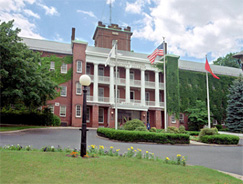About "Our Plural History"
Richard Norman, Ph.D.
"Our Plural History" (a project of
Springfield (MA) Technical Community College)
is an examination of the idea of pluralism in the United States. The website focuses on immigrant and ethnic groups in the Connecticut River Valley of western Massachusetts.
We considered several different approaches to organizing the website. We decided against separating the material into sections devoted to particular ethnic and immigrant groups — African Americans, Irish, Italian, etc. — as this approach tends to convey fragmentation and emphasizes the boundaries that divide different groups. We wish to emphasize instead the admittedly difficult, but always possible, reconciliation of contending group identities.
In the end we chose a more integrative approach, organizing the website around themes arranged in chronological order. This allowed us to trace the development of a plural society over time, and to compare the experiences and contributions of diverse groups, noting both commonalities and contrasts. For example, the section devoted to the theme of Industrialization and Immigration includes essays on economic and technological change, sports, and the migration of African Americans to the city of Springfield, Massachusetts. There are also essays on the creation of distinctive immigrant communities and the challenges of assimilation. Polish, Greek, and Jewish immigrants faced similar difficulties in adjusting to life in the United States, but each group faced those challenges with its own particular set of cultural and communal resources. Moreover, industrialization, technological change and urbanization transformed American society and culture as a whole, shaping the lives of immigrants and the native-born alike. The modern sport of basketball, originating in Springfield, provided a distinctly “American” forum in which members of an increasingly multicultural society participated together. This integrative approach fosters an understanding of how we are different, and how much we have in common.
The website provides a resource for students, educators, and members of the local community , and can serve as a guide for anyone interested in the development of cultural and social patterns where they live. The chronological-integrative approach can be applied to any region or locality. Springfield and the Connecticut River Valley have a long history, and a wide variety of ethnic, racial and cultural groups have settled here, but a project on the history of cultural communities can focus on any appropriate time period and may include any number and variety of different groups. Materials for such a project can be drawn from many sources: local libraries and museums, community organizations and neighborhood associations, church histories, local monuments and historical markers, newspaper archives, historical and family photographs, cultural festivals, buildings and street signs, memoirs and interviews.
The topics featured on this site are not simply confined to Springfield or the Connecticut River Valley of western Massachusetts. Every city, town, and region of the country has grappled with and continues to deal with the idea of pluralism. To that end Springfield Technical Community College feels that this project can be replicated and is interested in exploring partnerships with colleges, community organizations, and primary schools nationwide in order to expand our collective understanding of pluralism.
We encourage visitors to contact us with comments, to share their own stories, or to seek out partnerships on similar projects at
ourpluralhistory@stcc.edu
.
Funding for this project provided by
Ford Foundation
Site Credits
Springfield Technical Community College Project Management Team
Co-Directors:
Richard Parkin, Assistant Vice President/Academic Affairs
Arlene Rodriguez, Dean, Art/Humanities and Social Sciences
Project Founder:
Cecelia Gross, Professor of History
Web Content Director:
John Diffley, Adjunct Professor of History
Curriculum and Research Specialists:
Richard Norman, Adjunct Professor of History
Donald D'Amato, Adjunct Professor of History
Content Developers:
Lori Satter, Graduate Researcher, University of Massachusetts-Amherst
Kate Freedman, Graduate Researcher, University of Massachusetts-Amherst
Gwendolyn Hendrix McGregor Scherer, Former Professor of History and Art
Scholar Historians:
Marla Miller, Department of History, University of Massachusetts-Amherst
Kevin Sweeney, Department of History, Amherst College
Copy Editors:
F. Davis Johnson, Professor of English
Gwendolyn White, Professor of English
Student Researchers:
Bessie Crenshaw
Leroy Crenshaw
T.J. Hall
William Hawlsey
Stephen Martin
Karen McKenzie
Dawn Moore
Robert Reynolds
Tina Taylor
Luora Webb
S2N Media — Web Development
www.s2nmedia.com
Kathryn Prunsinski
Joan Endres
Jennifer Zukowski
Michael Conlon
John Prusinski
Acknowledgements
Our Plural History
would like to thank:
annalise fonza
Boston Public Library, Norman B. Leventhal Map Center, Boston, MA
ESL Department, Springfield Technical Community College
Frank Gregory
George Howe
Jones Library, Amherst, MA
Library of Congress
Lynne Spichiger
Mary Omartian
Pamela Patrick White
Pan-African Historical Museum USA (PAHMUSA), Springfield, MA
Pocumtuck Valley Memorial Association/Memorial Hall Museums, Deerfield, MA
Rokeby Museum, Ferrisburgh, VT
Setta McCabe
Springfield Armory National Historic Site, Springfield, MA
Springfield City Library, Springfield, MA
Springfield College Archives and Special Collections (Babson Library), Springfield, MA
Springfield Technical Community College Library
The Museum of Springfield History, Margaret Humbertson and Cliff McCarthy, Springfield, MA
Wistariahurst Museum, Holyoke, MA
